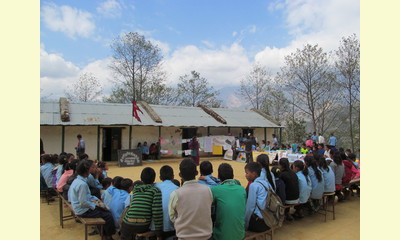|
|
Nepal: Learning English at the cost of the mother tongues?
an article by Prakash Khadka
Once, a poor mother of a young girl asked my help to
find a cheap college for her daughter. Why don’t you
enroll in a government campus- I suggested, “No…, I
can’t understand Nepali medium teaching properly”-
the girl replied.

Poor government school (once upon time halted by Maoists) organising an exhibition in Dailekh; western Nepal.
click on photo to enlarge
A couple of weeks before where I was facilitating
an animation training in central south, a large
number of school children in the neighborhood were
having their morning assembly. A teacher standing
in front of them said loudly, “you are not allowed
to speak Nepali inside the school premises, you
should practice English”.
As private schools even though they don’t provide
quality education with less experienced teachers
are mushrooming to teach in the English medium,
hundreds of government schools are already closed
in major cities. A couple of government schools
still in service are in deplorable condition at
the heart of Kathmandu. The same condition exists
in remote villages too. Even if a villager has
little income; they send their children to the
English medium schools.
One of my friends who teaches in government and
private colleges in the capital said, "actually
Nepali students are suffering; they hardly follow
teachings. They even can’t question back if they
don’t understand because it is matter of prestige
for not knowing English."
Recently, Tribhuwan University (government)
introduced semester system for the first time. All
students welcomed the move and hoped that academic
activities will be on time. Very soon, despite
such expectation, many students left the class as
they found medium of teaching was in English.
Commenting on some English national dailies, one of
my Irish friends said, "Nepali reporters tried to
show their language expertise by using old fashioned
difficult words, in fact it looks rather funny."
People feel proud when they speak English.
Especially some of the Nepali yuppie development
workers and educators pretend to speak English mixed
with Nepali.
Various social and economic factors have forced
people to believe that "Knowing English makes you
better." The main concern I am trying to raise
here is how the Nepali language is being degraded as
people have a growing tendency to learn English.
Nepal has 125 caste/ethnic groups and 122
languages/dilates according to the 2011 census.
At the micro level, Nepali Khash Bhasha has
dominated all mother tongues as country had been
through vast Hindunizations process in its
history. But at macro level, English has covered
them all.
In this regard, Dr.Tove wrote me, "Sometimes
English is learned at the cost of the mother
tongues. The worst way of teaching people is to
use English as the main medium of education from
the very beginning. They have been fooled to
believe that English-medium education leads to
good competence. It often means that those
children never learn their mother tongues and/or
Nepali up to a high level, especially in writing."
In order to protect the Nepali language, the
government needs to streamline Nepali medium
education by controlling excessive English
oriented teachings. But this may violate rights
to choice; only an individual concern could be
helpful in this regards. Hopefully, future federal
states of Nepal may promote education in their
mother tongue, protecting linguistic rights.
|








|
DISCUSSION
There is no question yet associated with this article.
* * * * *
Latest reader comment:

|
|









